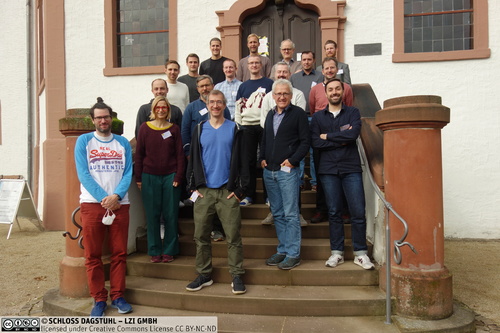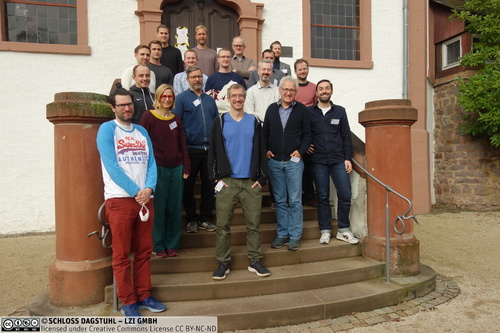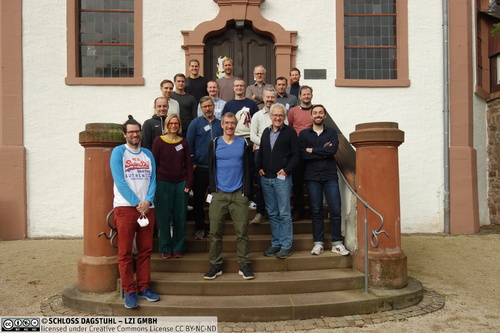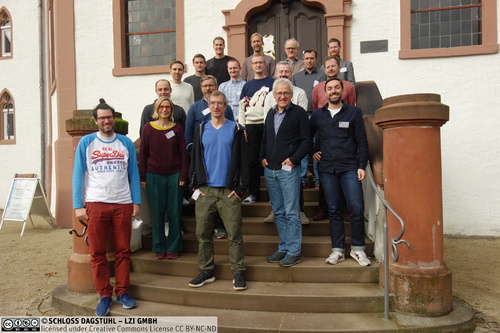Dagstuhl-Seminar 21411
Machine Learning in Sports
( 10. Oct – 15. Oct, 2021 )
Permalink
Organisatoren
- Ulf Brefeld (Universität Lüneburg, DE)
- Jesse Davis (KU Leuven, BE)
- Martin Lames (TU München, DE)
- Jim Little (University of British Columbia - Vancouver, CA)
Kontakt
- Shida Kunz (für wissenschaftliche Fragen)
- Simone Schilke (für administrative Fragen)
Advances in data collection techniques have enabled collecting large amounts of data about sports such as event data (e.g., time and locations of actions), tracking data (i.e., positional data), and athlete monitoring (e.g., bio-sensors, IMUs, GPS). These data are commonly and widely collected across multiple different sports. Even recreational athletes make use of a variety of sensors to monitor their training and performances. The advent of such data raises the need to exploit the collected data both from the theoretical (e.g., sports modeling) as well as practical (e.g., training in top level sports) perspective. Problem-solving solutions can be provided by an interaction between the sports science & informatics (S&I) and the machine learning (ML) communities. Machine learning is emerging as a powerful, new paradigm for sports analytics, as it provides novel approaches to making sense of the collected data. However, the S&I and ML communities are traditionally separate, each with its own agenda. The Dagstuhl Seminar aims to bring together top researchers and practitioners who are active in these two fields that can contribute to an assessment of their potential synergies.
The seminar aims to discuss the following key questions: (i) What challenges arise when analyzing new, and massive amounts of data that are available about sports? (ii) What are the key open problems that require a combination of sports science and machine learning know-how to solve? (iii) How can we best facilitate interaction among computer scientists, sports scientists, and end-users? (iv) How can we foster interdisciplinary collaborations on a regular basis? We plan to discuss these questions along different dimensions, such as different types of data, tactics and strategy, player actions, athlete monitoring, and privacy/dual-use.
The goal of the seminar will be to identify key challenges and opportunities that arise when combining computer science and sport science: joint research can lead to synergies that, ultimately, form the basis for breakthroughs and the connections and ideas formed during the seminar ideally lead to future research projects or publications dealing with interdisciplinary research on making sense of data in sports.
 Ulf Brefeld, Jesse Davis, Martin Lames, and Jim Little
Ulf Brefeld, Jesse Davis, Martin Lames, and Jim Little
Sports has become an incredibly data rich field with the advent of data sources such as event data (e.g., time and locations of actions), tracking data (i.e., positional data), and athlete monitoring (e.g., bio-sensors, IMUs, GPS). These data are commonly and widely collected across multiple different sports, both on a professional and recreational level. The advent of such data raises the need to exploit the collected data both from the theoretical (e.g., sports modeling) as well as practical (e.g., training in top level sports) perspective. Problem-solving solutions can only be provided by an interaction between the sports science & informatics (S&I) and the machine learning (ML) communities. Machine learning is emerging as a powerful, new paradigm for sports analytics, as it provides novel approaches to making sense of the collected data. However, the S&I and ML communities are traditionally separate, each with its own agenda. The seminar aims to bring together top researchers and practitioners who are active in these two fields that can contribute to an assessment of their potential synergies.
We structured the seminar along five different themes, each of which was the focus of between half and a full day. Given the diversity of the participants' backgrounds in terms of discipline, each theme began with overview to get everyone on the same page. Then there were more detailed presentations. The five themes were:
- Machine learning meets sports The goal of this session was to provide an overview of some of the machine learning techniques (predictive modeling, text mining) and how they can be applied in the sports context. The illustrative applications where ML can play a role included assessing the performances of teams and players, supporting sport broadcast, assessing fans reactions to rule changes and helping reduce the time burden on video analysts.
- Sports science meets machine learning The goal was to provide an overview of basic concepts in sports science to inform researchers from machine learning. The basic concepts were the relation between competition, training and athlete's abilities, the structure of performance in different sports, and the demand for support in sports practice. In particular, the structure of team sports as dynamic interaction processes with emergent behavior was explained as this the most frequent application field for machine learning in sports.
- Computer vision for sports The session aimed to expose the participants to the practice of gathering information about team sports through analysis of visual information. The session began with an overview of the general practice of computer vision for sports. Three of the presenters are from industry, representing companies with significant presence in the business of providing to analytics producers information on team sports such as basketball, football (soccer), and ice hockey. The fourth presenter, from academia, discussed material on camera planning and analytics and in addition has himself been involved in tech transfer of visual analytics methods from amateur sports. The overall goal, i.e., informing the participants regarding methods and applications of vision, was well met by the lectures of these experienced researchers.
- Interdisciplinary view on tactics The session aimed to build a common understanding of tactics and their implementation in predictive/generative models. It is still an open question how to represent overarching long-term strategies in computer models and different ideas were discussed on the example of overview and contributed presentations.
- Explaining, interpreting, and visualizing models and data for sports A key challenge is effectively conveying the results of machine learned models to domain experts, which is compounded by the black-box nature of many such models. This session highlighted a variety of techniques for meeting this objective, with illustrative examples arising from practice were shown for a variety of sports such as ice hockey, table tennis and football. This remains an active area of research and variety of lessons learned and ideas for improving the communication between domain-experts and technical-experts were discussed.
 Ulf Brefeld, Jesse Davis, Martin Lames, and Jim Little
Ulf Brefeld, Jesse Davis, Martin Lames, and Jim Little
- Gabriel Anzer (Hertha BSC - Berlin, DE) [dblp]
- Arnold Baca (Universität Wien, AT) [dblp]
- Pascal Bauer (DFB - Frankfurt, DE) [dblp]
- Ulf Brefeld (Universität Lüneburg, DE) [dblp]
- Jesse Davis (KU Leuven, BE) [dblp]
- Björn Eskofier (Universität Erlangen-Nürnberg, DE) [dblp]
- Dennis Faßmeyer (Leuphana Universität Lüneburg, DE)
- Eric Hayman (ChyronHego - Stockholm, SE) [dblp]
- Arno J. Knobbe (Leiden University, NL) [dblp]
- Otto Kolbinger (TU München, DE)
- Philipp Kornfeind (Universität Wien, AT) [dblp]
- Martin Lames (TU München, DE) [dblp]
- Daniel Link (TU München, DE) [dblp]
- Björn Mäurer (IAT - Leipzig, DE)
- Fabrizio Pece (Vizrt AG - Zürich, CH) [dblp]
- Martin Rumo (OYM AG - Cham, CH) [dblp]
- Tiago Guedes Russomanno (University of Brasilia, BR)
- Marc Schmid (TU München, DE) [dblp]
- Jan Van Haaren (FC Bruges, BE) [dblp]
- Benedicte Vanwanseele (KU Leuven, BE) [dblp]
- Albrecht Zimmermann (Caen University, FR) [dblp]
- Luke Bornn (Simon Fraser University - Burnaby, CA) [dblp]
- Lotte Bransen (SciSports - Amersfoort, NL) [dblp]
- Mirjam Bruinsma (AFC Ajax - Amsterdam, NL)
- David Carey (La Trobe University - Melbourne, AU) [dblp]
- Xiangtong Chu (Zhejiang University, CN)
- Laura de Jong (Deakin University - Melbourne, AU)
- Uwe Dick (Sportec Solutions AG - Ismaning, DE) [dblp]
- James Elder (York University - Toronto, CA) [dblp]
- Irfan A. Essa (Georgia Institute of Technology - Atlanta, US) [dblp]
- Mehrsan Javan (Sportlogiq - Montréal, CA) [dblp]
- Jim Little (University of British Columbia - Vancouver, CA) [dblp]
- Patrick Lucey (STATS Perform - Chicago, US) [dblp]
- Konstantinos Pelechrinis (University of Pittsburgh, US) [dblp]
- Eraldo Luis Rezende Fernandes (Leuphana Universität Lüneburg, DE) [dblp]
- Karen Roemer (Central Washington University - Ellensburg, US) [dblp]
- Yannick Rudolph (Leuphana Universität Lüneburg, DE & SAP SE - Berlin, DE) [dblp]
- Oliver Schulte (Simon Fraser University - Burnaby, CA) [dblp]
- William Spearman (Liverpool Football Club, GB) [dblp]
- Karl Tuyls (DeepMind - London, GB) [dblp]
- Maaike Van Roy (KU Leuven, BE) [dblp]
- Jiang Wu (Zhejiang University, CN)
- Yingcai Wu (Zhejiang University, CN) [dblp]
- Hui Zhang (Zhejiang University - Hangzhou, CN)
- Zhou Zheng (Zhejiang University - Hangzhou, CN)
Verwandte Seminare
- Dagstuhl-Seminar 06381: Computer Science in Sport (2006-09-17 - 2006-09-20) (Details)
- Dagstuhl-Seminar 08372: Computer Science in Sport - Mission and Methods (2008-09-07 - 2008-09-10) (Details)
- Dagstuhl-Seminar 11271: Computer Science in Sport - Special emphasis: Football (2011-07-03 - 2011-07-06) (Details)
- Dagstuhl-Seminar 13272: Computer Science in High Performance Sport - Applications and Implications for Professional Coaching (2013-06-30 - 2013-07-03) (Details)
- Dagstuhl-Seminar 15382: Modeling and Simulation of Sport Games, Sport Movements, and Adaptations to Training (2015-09-13 - 2015-09-16) (Details)
- Dagstuhl-Seminar 24081: Computational Approaches to Strategy and Tactics in Sports (2024-02-18 - 2024-02-23) (Details)
Klassifikation
- artificial intelligence / robotics
- computer graphics / computer vision
Schlagworte
- sports
- machine learning
- computer vision
- sensors





 Creative Commons BY 3.0 DE
Creative Commons BY 3.0 DE
